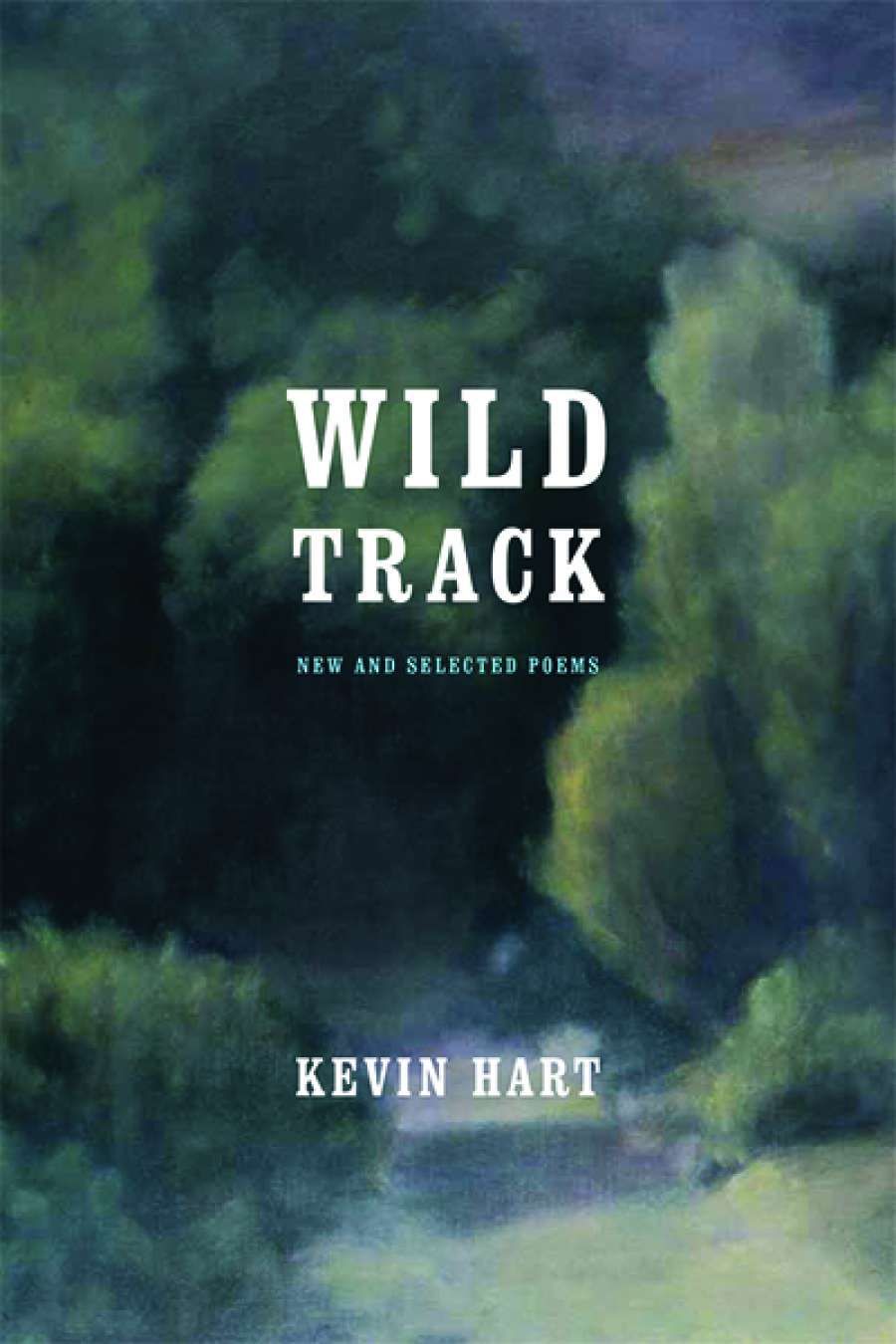
- Free Article: No
- Contents Category: Poetry
- Custom Article Title: Geoff Page reviews 'Wild Track' by Kevin Hart
- Review Article: Yes
- Online Only: No
- Book 1 Title: Wild Track
- Book 1 Subtitle: New and Selected Poems
- Book 1 Biblio: University of Notre Dame Press, US$25 pb, 216 pp, 9780268011215
Though Hart clearly believes in a personal god, he is concerned with the numinous rather than pedantic moral injunctions. He is interested in that quality of our experience that science doesn’t talk about. Sometimes, for Hart, the numinous will seem an added dimension – at other times, the underlying one.
Prayers, which, by definition, work in this realm, recur throughout Hart’s work. Most of them are addressed to a person (or force?) he calls the ‘Dark One’. The presence of this figure appears to be intermittent; he is not inclined to answer questions and is mostly elusive and enigmatic. A clear sense of this is seen in the last two stanzas of the fourth section of Hart’s sequence, ‘Colloquies’, where the poet complains: ‘I talk to you / And all my words black out / You talk to me / In words like morning snow. // There are no words, / Dark One, no words at all / I read your book / But you compose in white.’
The issue of an afterlife is treated almost casually – speculatively, rather than with fear or rising exultation. Clearly the ghosts of the poet’s parents and his infant sister are important to him but, as spirits, they seem neither to be suffering nor rejoicing. The last three lines of Hart’s touchingly simple ‘Lullaby’, for instance, strongly suggest the ongoing connection between the living and the dead. ‘Our parents both have said adieu – / and you’ve been dead these sixty years: / Now I must carry you.’
While Hart’s religious poems depend a great deal on indirection, his erotic ones are often much more direct. They go back as far as ‘Lovers’ in his first book (a poem wisely omitted here) and continue through to the long poem which concludes the volume. They are addressed to a finite succession of unnamed women over time and tend to be arranged in sequences. Among them are ‘Nights’, ‘Nineteen Songs’, ‘Amo Te Solo’, and ‘Sugar’. In their vivid, and often dramatic, sensuality, they make an interesting (and probably conscious) contrast to the abstraction of his poems on the intangible. Sometimes the sex is in retrospect; at other times, in anticipation – as in this stanza from the sequence, ‘Amo Te Solo’: ‘There are three days inside me, waiting there, / And each one whispers of your long smooth legs, / The feel of them under a cotton sheet / Then round my head.’
‘Although he has won extravagant praise from Americans such as Charles Simić and Harold Bloom, he remains, to Australian readers, an Australian poet’
If sex and religion are poles in Hart’s work, it is also worth mentioning, in this context, the city of Brisbane where he spent his adolescence. Brisbane is the third corner of a triangle. Its heat, humidity, and dramatic weather recur throughout the book. It is a city with memories the poet is unable to escape – or doesn’t want to anyway. The sensuality of Hart’s love poetry begins here. A clear hint of it can be felt in his relatively early poem, ‘Summers’: ‘A dozen years ago, in love for the first time, / I took a girl on a heaving, gearless council bus / To Wynnum, Brisbane’s dusty Lido, / And sat all day / Upon a pier until her lips began to taste of salt.’
Back then, Hart used free verse with a precocious skill, but in more recent years he has been much more inclined to a fairly strict iambic metre (often in pentameters). This does much to hold the poems together and establish, particularly in the religious poems, a quiet but intense rhetoric. Only occasionally do we feel the regularity is too much; or that it has been accidentally, rather than cleverly, disrupted.
Charles Simić declared some years back that ‘Kevin Hart is one of the finest poets writing in English today’. A slow, thoughtful (even meditative) reading of Wild Track is a more than pleasurable way to make up your own mind about this.


Comments powered by CComment